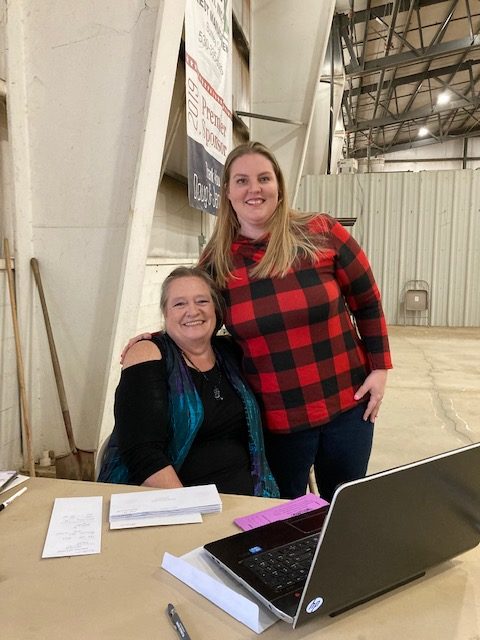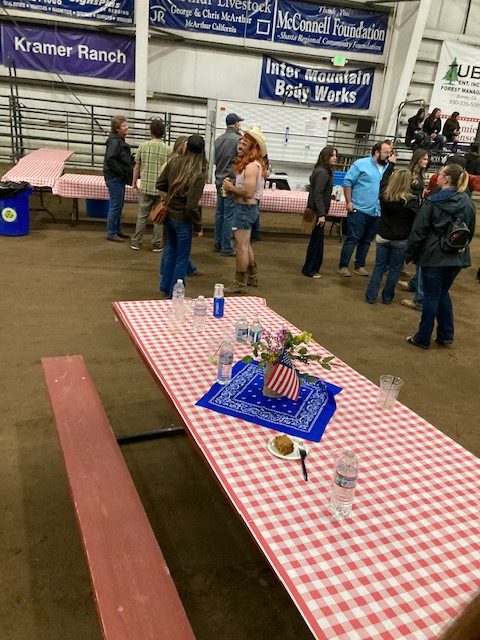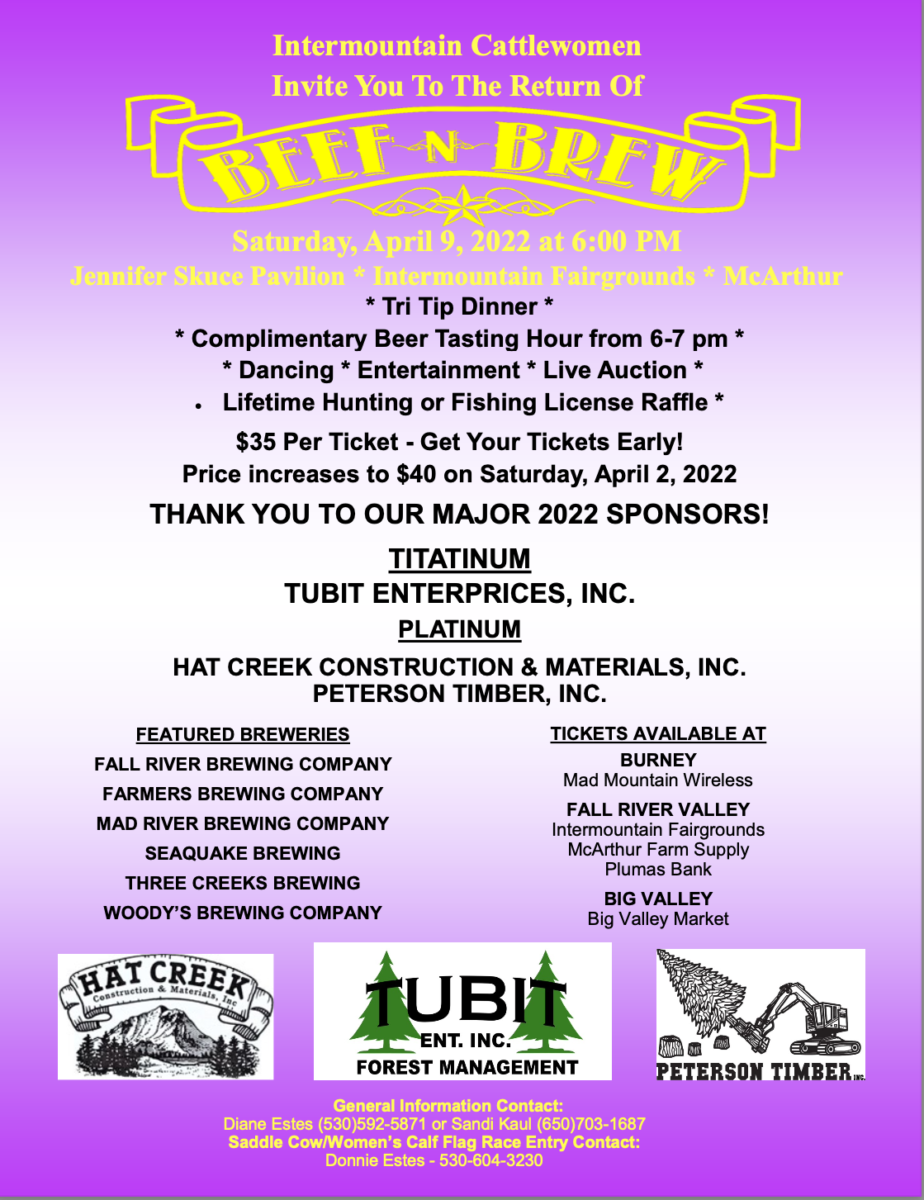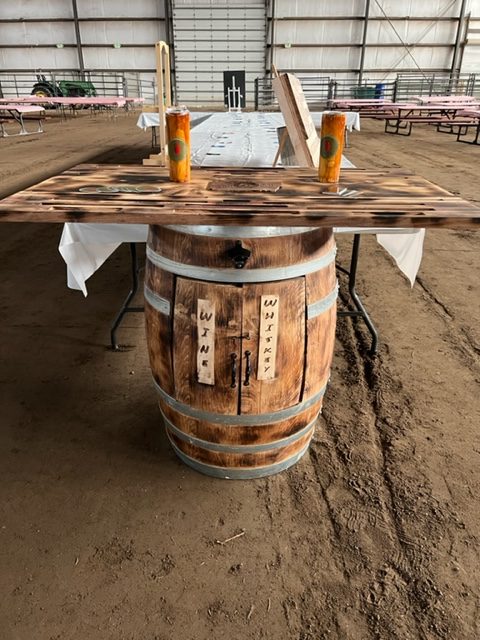Sandi Kaul is co-treasurer and membership chair of the Intermountain Cattlewomen (IMCW), a non-profit in Northern California.
The IMCW is a subsidiary of the California Cattlewomen, a subsidiary of American National Cattlewomen, Inc.
Over the many years Sandi lived in the San Francisco Bay Area with her husband and daughter, they often visited the intermountain area and enjoyed camping, fishing, and the outdoors.
Her family’s love for the area drew them to move there in 2010, and now Sandi is busy helping Intermountain Cattlewomen educate people on a subject near and dear to the hearts of many Americans: beef!

Sandi Kaul and her daughter, Yvonne

Mingling at Beef n’ Brew
How the Intermountain Cattlewomen came to be
“Back in 1918, the Intermountain Fairgrounds were built because local ranchers wanted a place to put on a fair. They succeeded, and to this day, the fairgrounds are the heart of our community,” Kaul told me in an upbeat voice. “They were ranchers who cared about where they lived, and that attitude is alive and well in our ranching communities today.” As we talked, it was evident by her tone that she loves her current role and is proud of the community.
In the early days, ladies supporting the beef industry were known as “Cowbelles” under the Cattleman’s Association, and by 1951 they formed their own organization, the California Cattlewomen.
The mission then was to support the beef ranching industry and educate the broader community about beef production in general and all that goes with it.
As the years ticked by, the Cattlewomen got organized nationally and grew into the organization we know today.
Cattlewomen today: Leading the way forward
“Really, everything we do is about education,” Kaul told me, the same excited tone in her voice. “We educate America, our community, and the rising generations about beef.” Then, she paused before saying, “When I say ‘beef’ to you, you probably imagine ranches.”
I answered, “Yes, I do, but I don’t know a whole lot more than that….”
“Exactly!” Sandi cut in. “Beef is tied to agriculture, and that means all kinds of things: cattle ranching, yes, but also managing herds, veterinary costs, being good stewards of the land… so much is involved! It’s a complex, fascinating industry that is important for America, and I love our work.”
The IMCW is so focused on education that they raise funds so they can offer scholarships each year for local students interested in furthering their education in agricultural-related disciplines. “The main way we can fund those scholarships,” Kaul said, “is our annual Beef n’ Brew!”
Beef n’ Brew
In April of this year, the IMCW put on their annual Beef n’ Brew celebration, their largest fundraising event.
“We were excited to be able to put it on this year, as our last one was in 2019 before Covid. We had a lot of fun this year and had all kinds of amazing events: saddle a cow and ride it (two-person teams, one saddles the cow and one attempts to ride, with mixed results), calf races, our breweries had tastings of new beer, and we had a big dinner at our fairgrounds, one of the uses those original ranchers had hoped for! It was a fantastic day.”

To put a point on the fantastic intermountain beer scene, Amanda Hutchings is a board member of the Redding Chamber of Commerce as well as being the Director of Community Impact at the Community Foundation of the North State and owns Fall River Brewing Co with her husband. They were on hand with the other brewers showing off the new tastes of the season.
“The only time the Fair was unable to be held was for one year during World War II, and then again during Covid, which made getting events back to normal all the more exciting,” Kaul said. “I bring up WWII because we also do a Veteran’s Day luncheon every year. We’re proud of our Veterans and national heritage here. The kids in 4-H and FFA (Future Farmers of America) make posters and put on an honor guard.”
Scholarships
“Beef is a foundational, American industry,” Kaul told me, not for the last time. “Our young people in 4-H and FFA receive a thorough education in agriculture before they graduate high school. It’s incredible to see what they learn. Not everyone realizes how vast the industry is, especially considering the ancillary industries around beef.
“Our scholarships allow the young people in our community to follow their passions in the AG industry, and whether they become ranchers themselves or work in another sector, we’re proud to help them achieve their goals for their career.”
Kaul said the events they put on all year make the scholarships possible and mentioned the donation from Pattern Energy along with other sponsors. “It’s due to our great partnerships locally and with larger companies that are now our neighbors, like Pattern Energy.”

Fall River Brewing showing off beer
Words to live by
“You know,” Kaul told me, “the people make this community, especially the people in beef and agriculture. Whenever there’s a crisis, injury, or hardship, these people come together in ways you don’t always see everywhere else. We love our land, and we take care of each other,” she said proudly.
As we were ending our time together, Kaul said she had some advice for me, and she got it off of a bumper sticker.
“Eat beef,” she said enthusiastically, “the west wasn’t won on salad!”